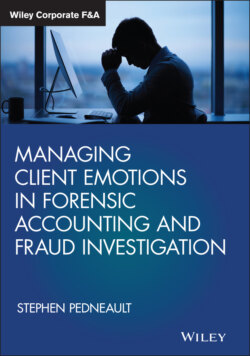Читать книгу Managing Client Emotions in Forensic Accounting and Fraud Investigation - Stephen Pedneault - Страница 7
Preface
ОглавлениеWHEN YOU PICKED UP this book, you most likely found the title to be unique from the other fraud material and books available. You might have asked yourself: Why would someone write a book about client emotions within the context of fraud investigations?
Well, the short answer is this: It has never been done before. The long answer is that emotions play a crucial role in the unfolding of fraud investigations. In this book, you will discover how intertwined client emotions become with the fraud examination process.
Even if you have significant experience in the fraud field, you may not realize how important addressing client emotions is in successfully resolving a fraud matter. You may think that fraud examiners, forensic accountants, and financial investigators should focus their expertise on accounting, numbers, electronic records, transactions, and other similar aspects of a case, leaving the issue of emotions to other more qualified professionals, such as psychologists and social workers. Well, that is certainly a valid position, and there is certainly a role for qualified counseling and psychology professionals to help the individuals involved in a fraud case. However, based on my 31 years of experience as a forensic accountant and fraud examiner, I have found that fraud examiners cannot avoid addressing client emotions in nearly every interaction during an engagement.
My clients and referral sources have come to expect me to be not only a forensic accountant, tax expert, auditor, strategist, technology expert, interviewer, and investigator, but also a social worker and psychologist. I attribute my career success to my ability to wear all these hats while providing my services.
As I've reflected back on my career, I've tried to identify the unique approaches that have set me apart from others in my field and allowed me to succeed in my engagements. I identified four major factors crucial to my success: (1) my ability to receive referrals for future engagements based on my reputation and experience; (2) the passion I bring to work each and every day; (3) my ability to provide superior customer service, even outside of normal business hours; and (4) my proficiency in networking and relationship building.
However, while each of those attributes has played a critical role in my success, the number‐one factor that truly differentiates my approach from others is how I treat the individuals involved in my matters – whether they be victims, attorneys, suspects, witnesses, family members, or coworkers.
In a fraud investigation, the important deliverables are determining the facts, identifying the person responsible, and holding the culprit accountable for their actions. However, my firm also focuses on bringing closure to the parties involved.
There is nothing magical in what I have accomplished in my career. The two things I have learned to do well in every engagement are to listen and to care. Surprisingly, listening and caring have played a much larger role in earning the respect of my clients than anything else I've accomplished in an engagement. I believe this is because – sadly – few people today focus their business approach and services on these basic needs.
If you listen to clients and care about them, you will succeed. Add passion to the equation, and your career and reputation will skyrocket. Mine did.
